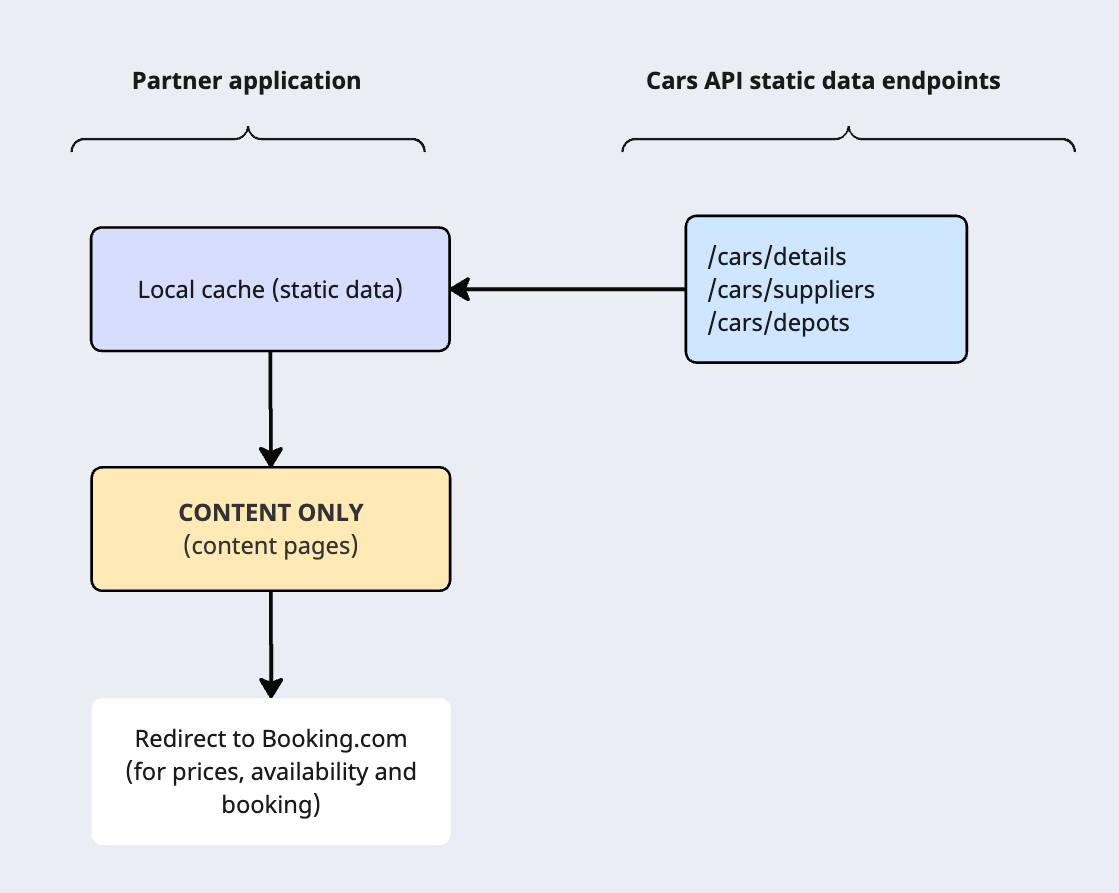Static data
Optimise your integration by storing car rental information that rarely changes.
Some car rental endpoints return static data — information that remains consistent over time, such as vehicle specifications, supplier details and depot locations.
To ensure fast response times and a smooth traveller experience, we recommend storing static data locally and refreshing it frequently or when updates occur. This approach reduces API calls, minimises latency, and improves reliability across your car content, search, look and redirecting flows.
Why store static data?
- Reduces API calls and server load.
- Ensures faster page loads for travellers.
- Supports smoother UI experiences for search results and car detail pages.
- Allows local filtering and display without repeated network requests.
Recommended storing practices
✓ Store the response from static endpoints in your local system.
✓ Serve stored details in subsequent user requests.
✓ Update the stored data periodically or when relevant changes occur, e.g., new images, updated specifications, or availability changes.

Do not store cars/search as it returns dynamic pricing and availability, which changes frequently.
Endpoints containing static data
Endpoint | Use | Best practices |
|---|---|---|
| /cars/details | Retrieve all relevant vehicle information. | Use last_modified to update your stored data. |
| /cars/suppliers | Get all car rental suppliers and logos. | Provide a specific ID to retrieve a single supplier; omit to get all. |
| /cars/constants | Retrieve static car constants such as fuel types, transmission, and depot services. | Store responses locally and update periodically; use to translate IDs into readable text. |
| /cars/depots | List all car rental depots. | Use last_modified to update depot cache. |
/cars/suppliers
→ Call the /cars/suppliers endpoint to retrieve a list of car rental suppliers and their logos.
If you want to get details about a specific supplier:
- Go to the cars/search response.
- Copy the returned supplier’s unique identifier (id).
- Use it in your /cars/supplier request.
Example request for a specific supplier:
{
"suppliers": [
62
]
}Omit the suppliers parameter to retrieve all suppliers.
Handling different supplier IDs
Suppliers may operate in multiple countries, so the same brand can have different IDs:
Example: Budget in country A has supplier id=2218, while in country B has supplier id=62
[
{
"id": 2218,
"name": "Budget",
"logo": "https://cdn.rcstatic.com/sp/images/suppliers/2218.png"
},
{
"id": 62,
"name": "Budget",
"logo": "https://cdn.rcstatic.com/sp/images/suppliers/62.png"
}
]
Use the
supplierID provided in your cars/search response for the selected route/ country to avoid confusion.
/cars/constants
→ Use the /cars/constants endpoint to retrieve static, predefined values (constants) used across car rental data — such as fuel types, transmission, payment timings, or depot services.
These constants rarely change and should be stored locally to enable clear labelling and translation of specific attributes in your UI.
Use this endpoint to translate fuel_policy, transmission, or payment_timing IDs into readable text for travellers (e.g., "manual" → "Manual", "prepay_refunds" → "Pre-purchase").
You can request all constants or filter by specific types.
Key parameters:
constants– Optional. Limits results to one or more constant groups, such as fuel_policies or transmission.languages– ISO language codes (lowercase). Defaults to en-gb.
Example: Retrieve constants in English and German:
{
"languages": [
"de",
"en-gb"
]
}Example: Retrieve only fuel_policies and transmission constants in English:
{
"constants": [
"fuel_policies",
"transmission"
],
"languages": [
"en-gb"
]
}Constants define static reference values. Their IDs are stable, but translations may be updated periodically. Store responses locally and update periodically or when localisation changes.
/cars/depots
→ Use the /cars/depots endpoint to retrieve all available depots.
maximum_results:Number of depots to return (10–100, multiples of 10).languages: ISO language codes (lowercase) for depot instructions. Defaults toen-gb.last_modified: Only returns depots updated since this timestamp.page: Pagination token from a previous response's next_page.
Example request:
{
"last_modified": "2025-11-01T11:05:00+00:00",
"maximum_results": 100,
"languages": [
"en-gb",
"nl"
]
}
Use
last_modifiedto update your depot data efficiently..
Depots that are not active in Booking.com will not appear in responses.
/cars/depot/reviews/scores
→ Use the /cars/depots/reviews/scores endpoint to retrieve a score breakdown for specific depots.
Scores reflect all Booking.com/cars traveller traffic and may not represent your own travellers’ experience. Display responsibly.
→ Call the /cars/depots/reviews/scores endpoint
Use the maxim_results parameter to control results per request.
{
"maximum_results": 10
}Learn more
- Explore the Cars Quick guide for a Search, look and redirect step-by-step guide.
- Check out our Migration guide for 3.2 cars migration.
- Refer to the Pagination guide for handling large result sets.